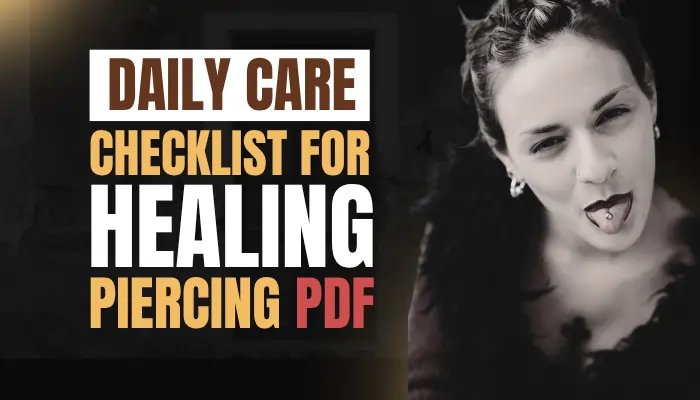Getting a new piercing is exciting but taking care of it every day is the key to making sure it heals safely, looks great, and lasts.
Whether it’s your ear, nose, lip, or belly button, all piercings need daily care to avoid problems like infection, swelling, or rejection.
Healing Piercing Daily Care Checklist with Free PDF Download
This simple checklist will walk you through everything you should do (and avoid) each day while your piercing is healing.

*Morning: Start Your Day Clean
#1. Wash Your Hands First
Always wash your hands before touching your piercing. This helps stop the spread of bacteria.
Never touch your piercing with dirty fingers, even for “just a second.”
#2. Rinse with Warm Salt Water (If Advised)
For fresh piercings, gently rinse the area with a saline solution or sea salt soak (¼ tsp non-iodized sea salt + 1 cup warm distilled water).
- For oral piercings: swish the solution in your mouth for 30–60 seconds
- For skin piercings: soak a cotton pad and gently press it to the area for 3–5 minutes
#3. Check for Signs of Irritation
Look for:
- Redness
- Swelling
- Yellow discharge (normal in small amounts)
- Crusties (dry, flaky skin or fluid)
Red, hot, or painful swelling may be a sign of infection. If it gets worse, see a piercer or doctor.
*After Meals (Or 2–3 Times Daily)
#1. Rinse Oral Piercings
If you have a tongue, lip, or cheek piercing, rinse after every meal using:
- Warm salt water
- Alcohol-free mouthwash
- Plain water (if nothing else is available)
This helps wash away food, bacteria, and plaque.
*Nighttime: Clean + Check In
#1. Wash Hands Again
Just like in the morning — clean hands first!
#2. Clean the Piercing Area
Use one of the following, based on the type of piercing:
| Piercing Type | Daily Cleaning Method |
|---|---|
| Ear/Nose/Body | Soak with sterile saline or salt water using gauze |
| Oral | Swish with salt water or non-alcoholic rinse |
| Surface/Dermal | Pat gently with saline; avoid pulling |
Do not use hydrogen peroxide, rubbing alcohol, or antibiotic ointments they can harm healing tissue.
#3. Pat Dry with a Clean Paper Towel
Don’t use a cloth towel (it can hold bacteria). Pat gently to dry the area completely.
Once Per Day: Jewelry Check (Without Twisting!)
- Make sure your jewelry is snug but not too tight
- Gently wipe any dried crust or buildup off the jewelry using a saline-soaked pad
- Never twist or spin the jewelry — it can tear healing tissue
If you’re unsure if the jewelry is healing right, read our full guide on jewelry fit and comfort.
What NOT to Do During Healing
Avoid these habits to prevent infections or delays:
- Touching your piercing with unwashed hands
- Using harsh chemicals (peroxide, alcohol, soaps with fragrance)
- Sleeping on fresh ear or face piercings
- Changing jewelry too early
- Swimming in pools, lakes, or hot tubs
- Wearing tight or dirty clothes over body piercings
- Smoking or vaping (for oral piercings)
- Using makeup or lotions near fresh piercings
Pro Tips for Faster Healing
- Eat healthy : vitamin-rich foods help your body heal
- Stay hydrated : dry skin = slower healing
- Avoid stress : it weakens your immune system
- Take zinc or vitamin C (with your piercer’s or doctor’s approval)
Healing Timeline Snapshot
Here’s how long different piercings usually take to heal:
| Piercing Type | Estimated Healing Time |
|---|---|
| Earlobe | 6–8 weeks |
| Helix/Cartilage | 3–9 months |
| Nose (nostril) | 2–4 months |
| Septum | 6–8 weeks |
| Lip or Labret | 6–8 weeks |
| Tongue | 4–6 weeks |
| Navel (Belly Button) | 6–12 months |
| Surface/Dermal | 3–6 months (or longer) |
Healing varies by body, lifestyle, and care routine. Don’t stop cleaning just because it “looks okay.”
Related Articles to Explore
Your downloadable printable checklist is ready!
Get PDF HereThis simple, clean format makes it easy to follow your daily piercing care routine.


